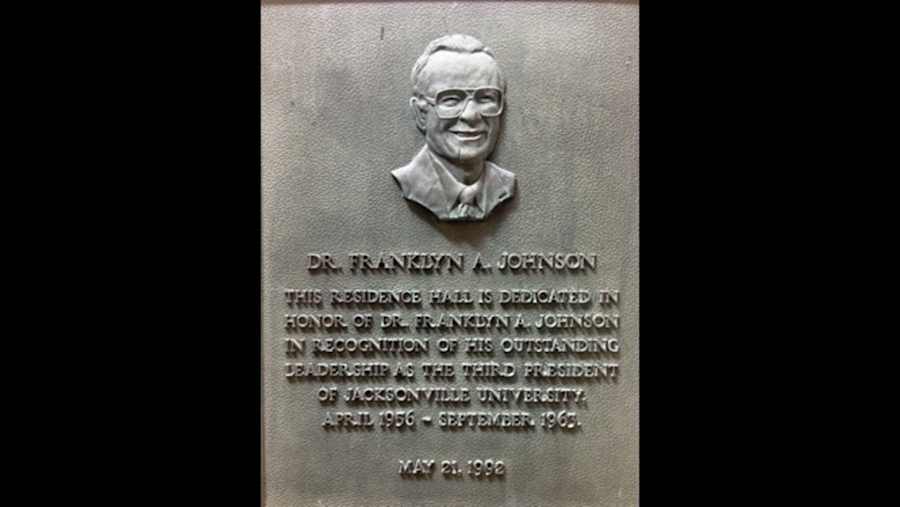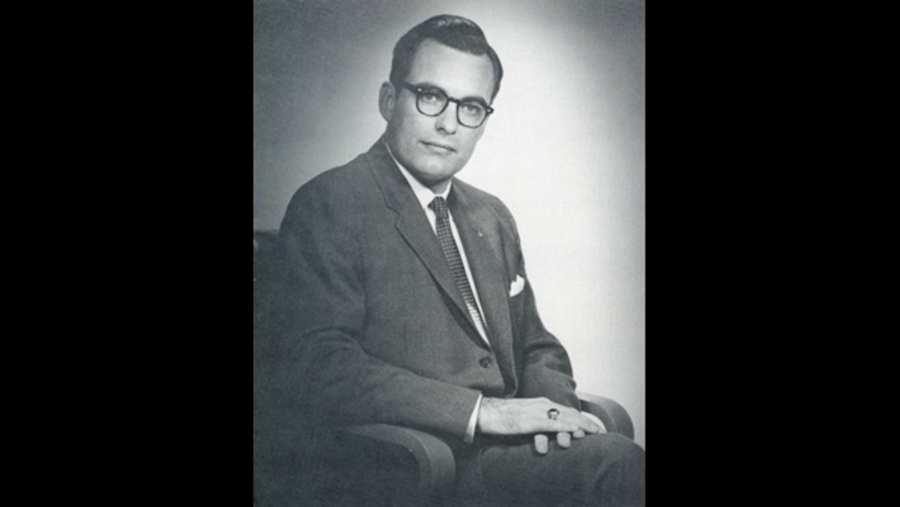JACKSONVILLE, Fla. – Dr. Franklyn A. Johnson, who masterminded Jacksonville University's transition to a full four-year institution as its president, while boosting enrollment, raising admission standards and strengthening faculty quality, died early Wednesday, July 24, of congestive heart failure. He was 91.
A World War II hero who received three Purple Hearts and was injured during the D-Day invasion, he was a Fulbright Scholar, Harvard graduate and International Affairs professor before joining JU in 1956 at age 34, as the country's youngest university president. He also authored a dozen books, one of which, "One More Hill," was named among the 50 best books on WWII.
Recommended Videos
Among many accomplishments at JU over his 7-year tenure, he helped achieve initial 4-year accreditation in 1961, in the shortest time possible; added the school's first dormitories and intercollegiate sports; saw enrollment rise above 2,000 for the first time; more than tripled the number of doctoral-level faculty; strengthened faculty pay, benefits and tenure; increased library holdings by tens of thousands of publications; solidified fundraising efforts; and presided during the addition of a new student center, other facilities and creation of a College of Fine Arts.

"I would not be here if not for him," said JU Past President and Chancellor Emeritus Dr. Fran Kinne, who Dr. Johnson convinced to become a professor at the University in 1958, before she was named Fine Arts dean in 1961 and then JU's first female president in 1979. "He set a pattern for us to be a strong, small liberal arts college with professional schools. He set the standard so high, and it was all about perfection."
Current JU President Tim Cost lauded the contributions of Dr. Johnson, who left JU in 1963 to become the fourth president of California State College at Los Angeles.
"We've lost a great citizen, not just here at JU, but in our country," he said. "Dr. Johnson served with the utmost courage in the military, and then became a remarkable success story in academia, in public life and at Jacksonville University. So many here owe such a debt of gratitude to him for the standards of excellence he established that are followed to this day at our University."
In "Our Place in the Sun: A History of Jacksonville University" by George Hallam, Dr. Johnson is described as coming aboard Jacksonville Junior College at a turbulent time, with a long, tough fight ahead toward four-year accreditation by the Southern Association of Colleges and Schools (SACS), enrollment lagging, admission standards wanting and a progressive-minded faculty facing community and board pressure.
Dr. Johnson addressed all of the issues with great vision and open-mindedness, those who knew him said. He also helped steer the University through integration in the early '60s at a time when it faced mounting pressure to do so, but also stared down internal and external pressure to keep the status quo.
His tenure was "very inspiring, but also very intensive," Kinne added. "I loved to tease him, because he was so very bright. I'd say, 'You know how to put a comma in a letter I'm going to write tomorrow.' He just was that sharp. He brought a very fresh look in his demand for quality, and was also a strong supporter of faculty and academic freedom. He really saw a bigger picture. All of it moved us to something much bigger in terms of quality and our future."
In a 2009 JU video interview to commemorate the University's 75th anniversary, Dr. Johnson remembered the monumental Board of Trustees decision in September 1956 to move Jacksonville Junior College to a four-year university.
"We had a yard man who lived in a little house at the front gate, Tony Borracino, and I had told Tony that I thought the board was going to approve this thing … and we had had a sign painted green and white that said 'Jacksonville University,' " Dr. Johnson said. "I said to Tony at about 8 or 9 p.m., when we finally broke up: 'OK, put it in Tony, we'll dig the holes and get a sign out on the road, so we'll know it's a University. We've got a lot to do to make it a University, but at least we'll say what we're doing.' "
Don Ames, a 1959 JU graduate who started as a student intern for Dr. Johnson and went on to become Vice President of Development during a 35-year career at the school, called Dr. Johnson a "determined leader not easily discouraged. He had a profound influence. I was shaped by Frank Johnson."

"He was part of that great generation, and he was the chief architect of the vision and dream of what was to become Jacksonville University," Ames said. "He laid the foundation. A true leader, a great communicator who had the ability to motivate, inspire and bring out the best in people."
Daughter Terri Cochran said she had very fond family memories of growing up on the campus of Jacksonville University. Dr. Johnson was the first JU president to live in what is now the River House.
"It was considered a mansion when we were there in the late '50s," she said with a laugh. "It was a wonderful childhood, and we even had goats and mallard ducks there."
She remembered her father as having done "amazing" things while at JU, "in every sense of the word."
"He was highly respected and did so many great things in his time, and he never wanted a lot of credit for it. He was very humble to the end. Just a great person."
Born Nov. 6, 1921, to Robert B. and Olyve Eckler Johnson in Honeoye Falls, near Rochester, N.Y., he volunteered for WWII, then attended Rutgers University, graduating magna cum laude, according to an official obituary released by his family. He was given a Fulbright Scholarship and went to the University of London in 1951-52. He held a Harvard Ph.D. and five honorary doctoral degrees, as well as numerous other academic honors.
According to his obituary, Dr. Johnson was a First Lt. in the 18th Regiment of the First Infantry Division. He made three invasions, fighting in North Africa, Sicily and Normandy, France. He received the Silver Star, three Bronze Stars, three Purple Hearts and the Distinguished Service Medal. He received the Croix de Guerre from France and the Legion of Honor from the French Government.
"Ten days after landing in Normandy he was shot by a German sniper. He ordered his men back, saying, 'I'm dying.' His family was informed that he was killed in action. However, German doctors took out part of one lung without anesthesia at a POW camp, and the Red Cross informed his parents he had survived," according to the obituary.
"Frank Johnson loved his division and his comrades, and until the day he died he mourned their loss," the family said in his obituary. "Very few men gave more to their country, their family and their comrades."
After leaving JU and California State, he became president of Southwest Florida College in Naples, Fla. He was also head of two major national foundations and head of the National Job Corps in Washington, D.C., under President Lyndon Johnson, according to his obituary. He also worked for the CIA for two years, and was a prolific author.
Dr. Johnson is survived by his wife, Elena; daughters Terri A. Cochran and Sandra Cole Fox; three grandchildren, Elizabeth J. Stevens (and husband Billy Stevens), Kevin F. Johnson and Alexander F. Johnson; three great-grandchildren, Trevin F. Stevens, Trinitee Stevens and Tristan Johnson; and numerous cousins. He was preceded in death by his son, Franklyn A. "Chip" Johnson Jr. A memorial service, to be announced, will be held at a later date. In lieu of flowers, the family requests that donations be given to the Wounded Warrior Project.


